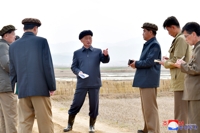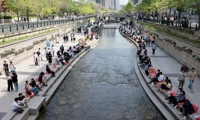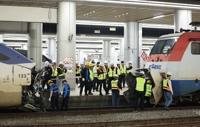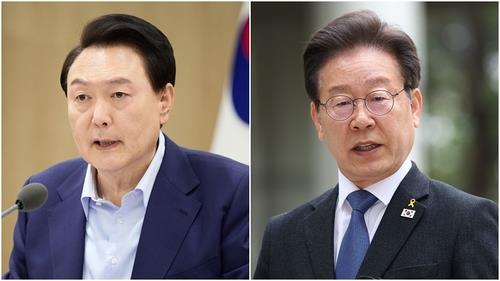(News Focus) Japan's greater military role double-edged sword for S. Korea
By Oh Seok-min
SEOUL, April 28 (Yonhap) -- South Korea fears Japan's greater military role abroad under revised U.S.-Japan defense guidelines will lead to a possible amendment of Japan's pacifist Constitution and a regional arms race amid a rising China and a nuclear-armed North Korea.
The Seoul government is scurrying to assess the impact of the new guidelines on its security interests despite Washington's hope for the new alliance to keep in check regional security.
On Monday, Washington and Tokyo announced the upgraded version of their 1978 defense cooperation guidelines for the first time in 18 years, factoring in changing security circumstances in the region marked by evolving threats by North Korea and China.
While addressing every aspect of the alliance and operational cooperation between the armed forces of the two nations, the new guidelines increase Japan's global presence by eliminating geographical restrictions on the military cooperation between the two that had been confined to areas around Japan.
The revision culminates the allies' perfect calculation: Washington needs Tokyo for its policy of rebalancing to Asia at a time when defense budgets are dwindling and Japan wants backing from the U.S. to free itself from its status as the invader during World War II.
"The stronger U.S.-Japan military ties would help boost deterrence against the belligerent North Korea," a senior defense ministry official in Seoul said, requesting anonymity.
"In that such a cooperative mechanism itself can prevent the North from opting for ruthless actions, the guidelines would do good at least in some degree to our security interests," he said.
Noting Seoul's long-held two-pronged approach in which it stands sternly over history while working closely for security interests, the official said that Seoul "has been and will be closely working with the two countries to deter and counter threats from the communist nation."
Despite frayed bilateral relations over Japan's renewed territorial claims to South Korea's easternmost islets of Dokdo and its failure to apologize for wartime atrocities, including the forced sexual enslavement of Korean women for its soldiers, Seoul last year clinched an arrangement with Japan and the U.S. on sharing their military intelligence on Pyongyang's nuclear and missile programs.
The bellicose regime has heightened tensions on the Korean Peninsula by pursuing nuclear programs and honing its aggressive skills.
But the renewed guidelines are a source of concern for South Korea at a time when there are ample signs that Japan has been trying to expand itself militarily, a reminder of South Korea's painful days under imperial Japan in the early 1900s.
Under the new guidelines, Japan's self-defense forces would be able to take, at least, a certain role in military operations led by U.S. troops in South Korea's airspace or at sea without Seoul's consent, as Tokyo is supposed to defend U.S. ships engaged in missile-defense activities and provide logistical support to U.S. forces when they are engaged in armed conflict in areas beyond the region.
"Though the pact stipulates that their act will be 'in accordance with international law, including full respect for sovereignty,' the expression is too abstract," said Lee Hye-jeong, a professor of international politics at Seoul's Joongang University.
"We are quite skeptical if Japan will be able to or is willing to seek Seoul's invitation when we are at war or in any chaotic situations," he said.
Japan's exercise of collective self-defense is seen as a precursor to its possible amendment of its pacifist Constitution, with lingering concerns that its military power could be misused. Collective self-defense means that Japan can fight alongside its allies even when the country itself is not under attack.
Responding to such worries, the Seoul government said the phrase "full respect of sovereignty" means that a prior consent is required, and that any bilateral agreement shall not put the name of a specific country in accordance with international law.
"The guidelines are more like political and general framework between the two countries," Seoul's foreign ministry official said. "We will have close consultations with the U.S. and Japan to have them better reflect our position in their envisioned military operational plans based upon the guidelines."
Allowing Japan to take a greater security role in the region and beyond could also spark an arms race in the Asia-Pacific area, which has already seen intense competition between the U.S. and China.
"Washington's pledge to send its newer capabilities to the Asia-Pacific region and Japan's pursuit to be an ordinary country will further prompt China and Russia to focus more on the military expansion," said Moon Chung-in, a professor of international politics at Seoul's Yonsei University.
"Such a cold-war structure would cause South Korea to be sandwiched between the big powers, hampering its security interests."
graceoh@yna.co.kr
(END)
-
 Overdue debut of Korean abstract art pioneer Yoo Young-kuk at Venice Biennale
Overdue debut of Korean abstract art pioneer Yoo Young-kuk at Venice Biennale -
 Defense chief says N. Korea's hypersonic missile 'unsuccessful' in last-stage glide flight
Defense chief says N. Korea's hypersonic missile 'unsuccessful' in last-stage glide flight -
 Relax, immerse yourself in scents at Venice Biennale's Korean Pavilion
Relax, immerse yourself in scents at Venice Biennale's Korean Pavilion -
 N. Korea has capability to genetically engineer biological military products: U.S. report
N. Korea has capability to genetically engineer biological military products: U.S. report -
 S. Korea marks 30th anniv. of Korean Pavilion at Venice Biennale with contemporary art
S. Korea marks 30th anniv. of Korean Pavilion at Venice Biennale with contemporary art
-
 Overdue debut of Korean abstract art pioneer Yoo Young-kuk at Venice Biennale
Overdue debut of Korean abstract art pioneer Yoo Young-kuk at Venice Biennale -
 Relax, immerse yourself in scents at Venice Biennale's Korean Pavilion
Relax, immerse yourself in scents at Venice Biennale's Korean Pavilion -
 S. Korea marks 30th anniv. of Korean Pavilion at Venice Biennale with contemporary art
S. Korea marks 30th anniv. of Korean Pavilion at Venice Biennale with contemporary art -
 Defense chief says N. Korea's hypersonic missile 'unsuccessful' in last-stage glide flight
Defense chief says N. Korea's hypersonic missile 'unsuccessful' in last-stage glide flight -
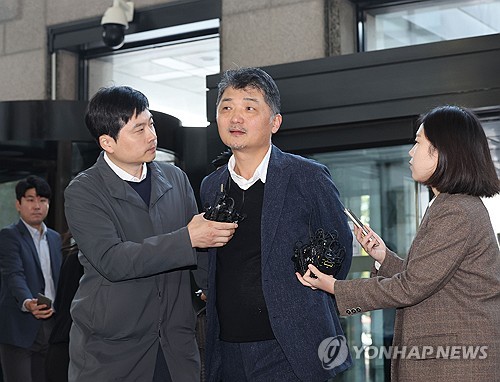 Questioning necessary for Kakao founder for suspected stock rigging: prosecution
Questioning necessary for Kakao founder for suspected stock rigging: prosecution
-
 Gov't likely to accept university chiefs' request to lower med school enrollment quota
Gov't likely to accept university chiefs' request to lower med school enrollment quota -
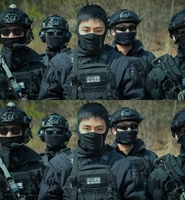 Facebook page unveils photos of BTS member V in counter-terrorism unit gear
Facebook page unveils photos of BTS member V in counter-terrorism unit gear -
 S. Korea not invited to G7 summit meeting this year: sources
S. Korea not invited to G7 summit meeting this year: sources -
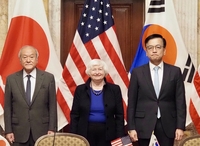 (4th LD) Finance chiefs of S. Korea, U.S., Japan recognize 'serious' concerns over 'sharp' won, yen depreciation
(4th LD) Finance chiefs of S. Korea, U.S., Japan recognize 'serious' concerns over 'sharp' won, yen depreciation -
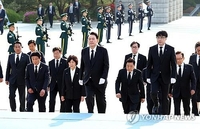 Yoon's approval rating sinks to lowest point since taking office
Yoon's approval rating sinks to lowest point since taking office















